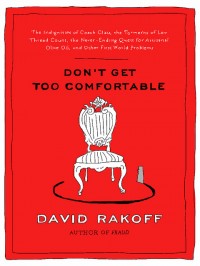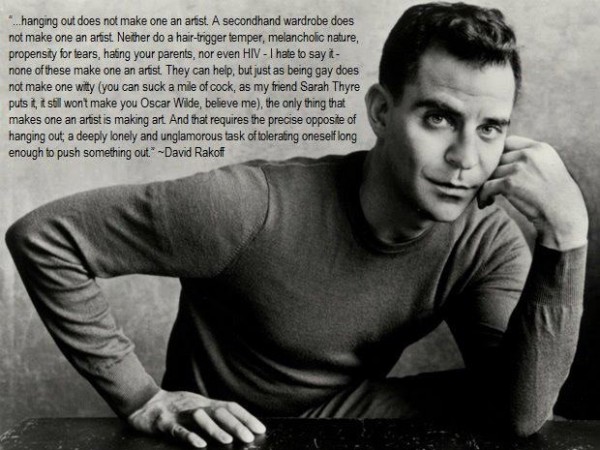Photo by DAVID DENTON
NEW YORK TIMES: Born in Montreal and raised in Toronto, Mr. Rakoff worked in the New York book publishing industry after studying at Columbia University. He wrote for numerous publications, including The New York Times Magazine, and in the early 1990s connected with fellow humorist David Sedaris, whose essay about the yuletide trials and tribulations of playing Crumpet the elf at Macy’s he had heard him read on the radio. Mr. Sedaris and Ira Glass, the future host and producer of “This American Life,” encouraged Mr. Rakoff to produce and perform more of his material, leading to a longtime association with that Public Radio International show. In 2001, Mr. Rakoff published the essay collection “Fraud,” which included his accounts of training with Mr. Seagal, the action-movie star and holistic shaman, as well as travels to Iceland and an ascent of Mount Monadnock in New Hampshire, dressed in “large, ungainly potatolike” Timberland boots that, he said, he disliked “with a fervor I usually reserve for people.” With characteristic mordancy, Mr. Rakoff added, “Just think, the shoes I wouldn’t be caught dead in might actually turn out to be the shoes I am caught dead in.” The book, in which Mr. Rakoff also wrote about being diagnosed with Hodgkin’s disease (“so highly curable that I like to refer to it as the dilettante cancer”) in his early 20s, was widely hailed. It was followed by two additional essay collections: “Don’t Get Too Comfortable,” published in 2005, and “Half Empty,” which was released in 2010 and went on to win the Thurber Prize for American Humor. MORE
DAVID RAKOFF: I am nothing if not compliant. I held still as I was shuttled back and forth through the wondrous high-tech doughnut, inhaling and holding my breath when instructed. Less than three minutes later, I hopped off the narrow table and put my sweater back on. “Have a fantastic day,” the technician said as I left. “Fantastic”? Fantastic days are what you wish upon those who have so few sunrises left, those whose lungs are so lesion-spangled with new cancer that they should be embracing as much life as they can. Time’s a-wasting, go out and have yourself a fantastic day! Fantastic days are for goners. […]
It has taken years for me to learn not to analyze the voices and vocabularies of those taking care of me. For the most part, I’ve been very lucky even as I’ve been less than fortunate. The doctors and nurses in my life don’t prolong the anticipation with pleasantries. We joke  around a lot, but that’s the second order of business. With a long illness, there are stretches of triumph that feel like cosmic rewards for good behavior followed by inexplicable setbacks that seem like indictments of your character. With so much muddy logic crowding out reason, it’s best when news, good or bad, is delivered quickly and clearly. I will forever be grateful to my oncologist for opening the door and saying, “Damn it, the tumor’s 10 percent bigger,” before he even said hello.
around a lot, but that’s the second order of business. With a long illness, there are stretches of triumph that feel like cosmic rewards for good behavior followed by inexplicable setbacks that seem like indictments of your character. With so much muddy logic crowding out reason, it’s best when news, good or bad, is delivered quickly and clearly. I will forever be grateful to my oncologist for opening the door and saying, “Damn it, the tumor’s 10 percent bigger,” before he even said hello.
I would never be able to do their jobs. In the same boat, I would probably mimic my first surgeon, who was so flustered and out of his depth — he’d seen the mass, taken out only part of it, thereby spreading cancer cells through the area, and closed me back up — that he engaged me in banter about the modern-dance scene and a ubiquitous no-knead-bread recipe before telling me that I had a malignancy. I felt hoodwinked and unsafe: the blood-soaked prom queen minus her vengeful power of telekinesis.
We like to think that the empathy broadcast with the swooping, downward intonation of the “aaawwww” is an evolutionary comfort; something we are programmed to welcome and offer freely ourselves. As a comment on something that has already happened, it probably works. But as an anticipatory tool, it does not soften the blow, indeed it does the opposite. It leaves you exposed, like grabbing onto the trunk of a tree for support in a storm only to find the wood soaked through and punky and coming apart in your hands. The sweetest bedtime-story delivery is no help when the words it delivers are a version of “ . . . and behind this door is a tiger. Brace yourself.” Have a fantastic day. MORE
![]() FRESH AIR: When Rakoff recently met up with Fresh Air’s Terry Gross at a coffee shop in New York, he told her that he did not have much time left. “I can’t presume to know what he was experiencing,” Gross says, “but from the things that he told me, and from the clarity in his eyes, he seemed sad but accepting of finality. If you don’t already know his work, I think you’ll be grateful you heard him today.” Rakoff appeared on Fresh Air in 2001 and 2010. We’ll remember him with excerpts from those two interviews. MORE
FRESH AIR: When Rakoff recently met up with Fresh Air’s Terry Gross at a coffee shop in New York, he told her that he did not have much time left. “I can’t presume to know what he was experiencing,” Gross says, “but from the things that he told me, and from the clarity in his eyes, he seemed sad but accepting of finality. If you don’t already know his work, I think you’ll be grateful you heard him today.” Rakoff appeared on Fresh Air in 2001 and 2010. We’ll remember him with excerpts from those two interviews. MORE
ROTTEN TOMATOES: In this darkly comic outing, which won the 2009 Academy Award for Best Live Action short, two gay men move into an apartment building, little realizing that the flat owns a very complicated and troubled history. Suddenly thrust into tumult of which they have no prior knowledge, the couple must contend with an obnoxiously nosy neighbor, a strung-out-drug dealer, and an overly intimidating, gun-packing husband with a deadly agenda. MORE

